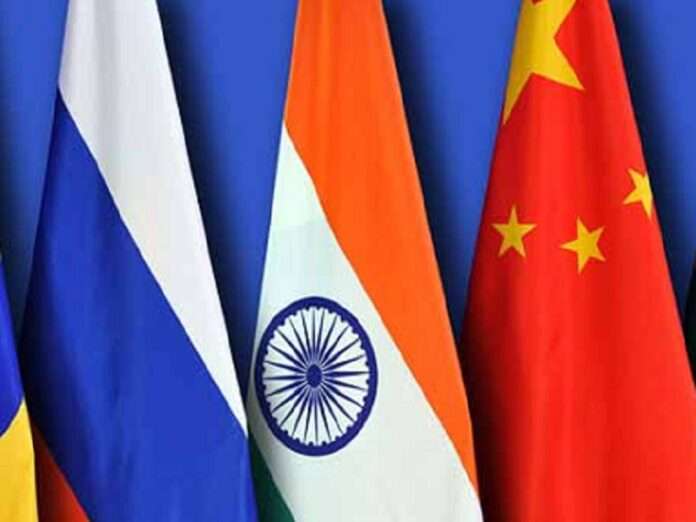Russian Foreign Minister Sergey Lavrov revealed during his trip to Beijing for talks with his counterpart Wang Yi that they agreed to begin discussions on the subject of Eurasian security. According to Sputnik, his exact words were that “The task of forming Eurasian security is called for. [Russian] President [Vladimir] Putin mentioned this in his address to the Federal Assembly. Our Chinese friends and I have agreed to start a dialogue, with the involvement of other like-minded [countries], on this issue.”
This is a noble pursuit whose principle should be applauded. It’s important that China is participating in Russia’s ambitious initiative since the People’s Republic is a major stakeholder in Eurasian security. Russia and China are strategic partners whose cooperation has tremendously expanded since the special operation began over two years ago. They work so closely together nowadays that they can in some sense be collectively referred to as the Sino–Russo Entente.
Russia and China are jointly accelerating multipolar processes with a view towards hastening the end of the US’ already declining unipolar system. This goal is globally significant and supported by practically all members of the Global South, which can also be referred to as the Global Majority. The only way that the US can offset this grand strategic trajectory is to manufacture or exacerbate disputes within and between Eurasian countries for divide-and-rule purposes, ergo the need to ensure Eurasian security.
The main challenge, however, is that “a new equal and indivisible security framework in Eurasia” of the sort that President Putin proposed during his federal address in late February can’t be created without resolving South Asia’s territorial disputes between India-China and India-Pakistan. Each has eluded resolution for decades already and occasionally flares up like the first did during summer 2020’s lethal Galwan River Valley clashes and the second in February 2019 over cross-border attacks/strikes.
The SCO would ideally be the primary platform for negotiating President Putin’s envisaged Eurasian security framework, but the 19th meeting of their Security Council Secretaries on 2-3 April in Astana didn’t broach that subject according to the group’s official press release that can be read here. Related issues were discussed, but there’s no mention of Russian Security Council Chairman Nikolai Patrushev bringing up his boss’ proposal and inviting his counterparts’ countries to participate in this dialogue.
The recently worsened Sino-Indo dispute brought about by China’s reaffirmation of claims to the Indian state of Arunachal Pradesh, which included renaming 30 villages and geographic features in a move that India’s top diplomat condemned as “senseless”, bodes ill for any speedy resolution of this issue. Furthermore, the optics of Lavrov inviting his Chinese counterpart to participate in President Putin’s proposed Eurasian security dialogue before his Indian one might offend some in Delhi.
To be absolutely clear, “India’s Top Diplomat Explained Why His Country Is Doubling Down On Ties With Russia” in late February and then a month later “Jaishankar Reaffirmed India’s Trust In Russia Amidst Claims Of The Latter Drifting Towards China”. The Russian-Indian Strategic Partnership is rock-solid and built upon a decades-forged foundation of trust between these Great Powers. It’s survived misunderstandings and faux pas before so it won’t be damaged by this latest move either.
That said, the fact that the Russian leader’s envisaged Eurasian security dialogue is beginning as a manifestation of the Sino-Russo Entente by dint of Lavrov formally inviting China to participate in it before any other country could unwittingly aid the pro-American lobby in India. This faction suspects that Russia is favoring the People’s Republic at their country’s expense per the will of its pro-Chinese faction and that India must thus pivot towards the US pronto in order to not be left hanging.
They fear that China would leverage Russia’s potentially disproportionate dependence on it to coerce Moscow into restricting arms exports to India, thus militarily neutering their rival and enabling the People’s Republic to make a power play for decisively resolving their dispute on its own terms. There’s no evidence that Russia will subordinate itself to China since the continued closeness of their country’s strategic ties with India preemptively averts this scenario, but the theory is still widespread in India.
Lavrov’s invitation inadvertently plays into these fears since the pro-American lobby in India might spin it as alleged proof that Russia could defer to China’s interests in their country’s territorial dispute. Policymakers might not feel comfortable participating in a security dialogue that they believe is Chinese-influenced either. This would be all the more unacceptable before the six-week-long national elections from 19 April-1 June end since Prime Minister Narendra Modi doesn’t want to look “weak” on China.
India could either agree to join these talks upon a potentially forthcoming formal invitation from Lavrov to his Indian counterpart Dr. Subrahmanyam Jaishankar before then at the risk of denting what might be Prime Minister Modi’s largest-ever number of votes or remain noncommittal and push it off till early June. The problem though is that the BRICS Foreign Ministers’ meeting will be held in Russia from 10-11 of that month, during which time the agenda for October’s leaders’ summit will be decided upon.
The pro-Chinese faction that’s emerged among Russia’s policymaking community during the special operation, whose members are motivated to accelerate China’s superpower trajectory as revenge against the US for perpetuating their proxy war, might be suspicious of India holding off on a decision. They could spin that as alleged proof that India is the US’ “Trojan Horse” in BRICS like a top Alt-Media influencer falsely claims in order to convince policymakers to have less respect for its interests.
The scenario of mutual Russian-Indian suspicions might then become a self-fulfilling prophecy by miscalculation due to the influence of the first’s pro-Chinese faction and the second’s pro-American one, especially if Russia doesn’t reconsider inviting Pakistan to BRICS like it was argued here that it might. This follow-up piece here argues that Pakistan wants Russia to innocently invite it to BRICS in order to create a wedge in relations with India that the pro-American faction there could then exploit to worsen ties.
The best way to preemptively avert this sequence of events from transpiring, which risks reversing tri-multipolarity processes and reverting the global systemic transition back to a more rigid form of Sino-US bi-multipolarity, is for Russia and India to candidly discuss differences of perception about the other. The pro-American and pro-Chinese factions within each’s policymaking community have an interest in widening them in furtherance of their own ideological interests but they aren’t yet influential enough.
What they can do, however, is spin certain moves and reactions such as Lavrov inviting China to participate in President Putin’s envisaged Eurasian security dialogue before India and the latter possibly pushing off a potentially forthcoming invitation to join it till after the elections end in June respectively. The reason why influential policymakers’ perceptions about the other might be influenced by such spin is because each is already aware of the other’s faction that’s working against their country’s interests.
They’re therefore preconditioned to suspect that these corresponding pro-American and pro-Chinese factions in India and Russia are playing games behind the scenes to promote their associated geopolitical causes. In this latest example, it might have been better in hindsight for Russia to formally invite all SCO members to participate in building its leader’s envisaged Eurasian security framework during last week’s Security Council Secretaries’ meeting instead of first inviting China to take part in it before all others.
Nevertheless, this possible faux pas doesn’t spell the impending end of the Russian-Indian Strategic Partnership by any stretch of the imagination, but it could advance the worst-case scenario of mutual suspicions beginning to influence how they formulate policy towards one another and their rivals. Candid dialogue is urgently required in order to keep tri-multipolar processes on track and avert an accidental reversion to bi-multipolarity that could be caused with time by not nipping this in the bud.






